135 years ago, the Russian army won the Battle of Shipka
Here you fell for the honor of the homeland dear,
You have brought an oath of allegiance to Russia
And remained faithful to the grave.
You have not kept the menacing ramparts,
Without fear went to battle the holy and right.
Sleep well, Russian eagles,
The descendants honor and remember your glory ...
poems on one of the plaques
135 years ago, Russian-Bulgarian troops won a victory over Shipka over the Turkish army of Vesil Pasha. At the beginning of 1878, the defense of Shipka was completed - one of the key and most famous episodes in the Russian-Turkish war of 1877 — 1878. The defense of Shipka bound the considerable forces of the Turkish army and provided the Russian troops with the shortest way to attack Constantinople. Shipka became the shrine of the Bulgarian patriots, since the Russian-Turkish war ended with the liberation of a significant part of Bulgaria from the Turkish yoke.
After crossing the Danube River and seizing bridgeheads, the Russian army could proceed to the next stage of the offensive — the transfer of Russian troops to the Balkan Mountains and a strike in the direction of Istanbul. The troops were divided into three detachments: Front, East (Ruschuksky) and West. The foremost - 10,5 thousand people, 32 guns under the command of Lieutenant General Iosif Vladimirovich Gurko, Bulgarian militiamen included in it, had to advance to Tarnovo, take the Shipka Pass, transfer part of the troops behind the Balkan Range, to South Bulgaria. 45-thousandth East and 35-thousandth Western units were to provide the flanks.
Gurko's troops acted quickly: June 25 (7 July) The advance detachment occupied the ancient Bulgarian capital, Tarnovo, and 2 (14) July crossed the Balkan Range through the hard-to-reach, but unguarded Khinkoi pass (located in 30 km east of Shipka). The Russians went to the rear of the Turks, who were guarding Shipka. Gurko's troops defeated Turkish troops near the village of Uflany and the city of Kazanlak and 5 (17) in July approached from the south to the Shipka Pass. Shipka defended 5-thousand. Turkish garrison under the command of Hulussi Pasha. On the same day, the pass attacked from the north a detachment of General Nikolay Svyatopolk-Mirsky, but failed. On July 6, the Gurko squad launched an offensive from the south, but also without success. However, Hulussi Pasha decided that the position of his troops was hopeless, and on the night from 6 to 7, July, he withdrew his troops along side roads to the city of Kalofer, leaving behind cannons. Shipka was immediately occupied by a detachment of Svyatopolk-Mirsky. Thus, the task of the vanguard was completed. The path to South Bulgaria was open, it was possible to attack Constantinople. However, there were no sufficient forces for an offensive in Zabalkanie, the main forces were connected with the siege of Pleven, and there were no reserves. Affected by the initial insufficient number of the Russian army.
The forward detachment Gurko was advanced to Nova Zagora and Stara Zagora. He had to take positions at this turn and close the approaches to the Shipka and Hainokoye passes. 11 (23) in July, Russian troops liberated Stara Zagora, and 18 (30) in July Nova Zagora. However, soon the 20-ths transferred from Albania came here. Corps of Suleiman Pasha, who was appointed commander of the Balkan army. Turkish troops immediately attacked, and 19 (31) July, a fierce battle took place near Stara Zagora. Russian soldiers and Bulgarian militia under the command of Nikolai Stoletov inflicted heavy damage on the enemy. But the forces were unequal, and the forward detachment was forced to retreat to the passes, where he became part of the troops of Lieutenant General Fyodor Radetsky (commander of the 8 corps).
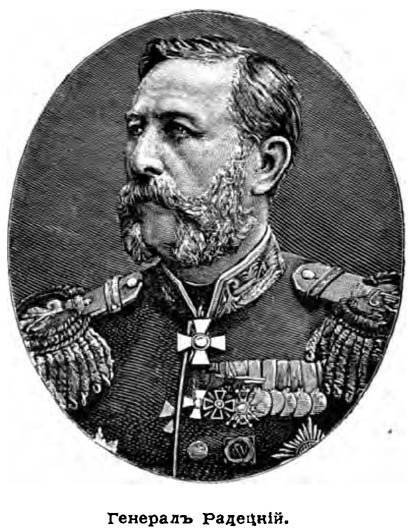
Fedor Fedorovich Radetsky.
Shipka Defense
Shipka at that moment was part of the southern front of the Russian army, which was entrusted to guard the troops of General Radetsky (8, part of the 2, Corps, Bulgarian squads, only about 40 thousand people). They were stretched for 130 versts, and the reserve was located at Turnova. In addition to protecting the passes, the Radetzky troops had the task of providing the left flank against Pleven from the side of Lovchi and the right flank of the Ruschuksky detachment from Osman Bazar and Slivno. Forces were scattered by separate detachments, at Shipka initially there were only about 4 thousand soldiers of the Southern detachment under the command of Major General Stoletov (half left the Bulgarians) against the 60 camps (about 40 thousand) Turks Suleiman Pasha. The Shipka Pass went along the narrow spur of the main Balkan Range, gradually rising to the mountain of Sv. Nicholas (Shipka key position), from where the road steeply descended into the valley of Tundzhi. Parallel to this spur, separated from it by deep and partly wooded canyons, mountain ranges stretched from the east and west, which dominated the pass, but connected to it only in 2-3 places by more or less trails. The position occupied by the Russian troops was inaccessible, stretching a few miles to the depth, along an extremely narrow (25-30 fathoms) ridge, but could be subjected to a crossfire from neighboring dominant heights. However, due to its strategic importance, the pass needed to be held. Shipkina reinforcements included trenches in the 2 tier and 5 battery positions, rubble and wolf pit were built in the most important areas, mines were put. The process of equipment positions was far from complete.
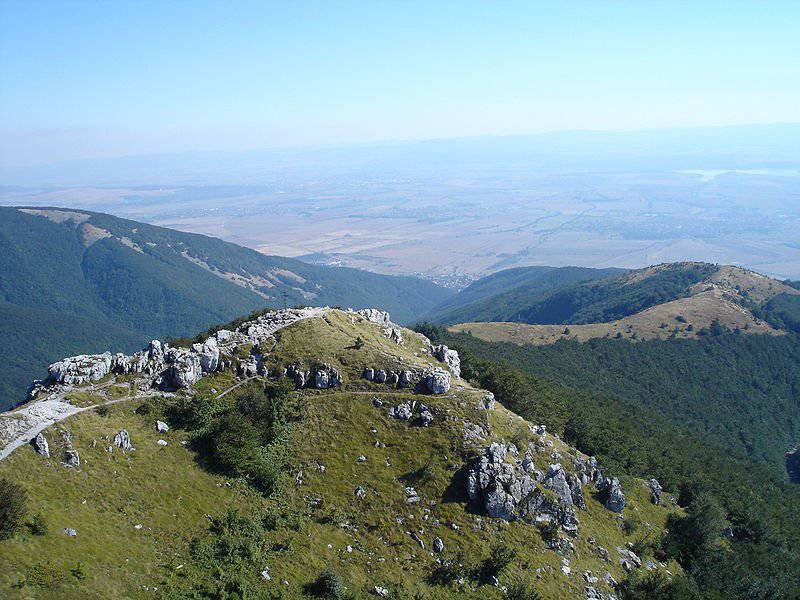
Shipka Pass.
The Turkish command, given the important strategic importance of the pass, set the task before the troops of Suleiman Pasha to capture Shipka. Then Suleiman Pasha was to develop an offensive in the northern direction, to unite with the main forces of the Turkish army, which attacked Ruschuk, Shumlu and Silistra, defeat the Russian troops and throw them over the Danube. 7 August Suleiman Pasha's troops approached the village of Shipka. At this time, Radetzky, fearing that Turkish troops would pass into northern Bulgaria through one of the eastern aisles and strike Tyrnov, receiving alarming reports about the strengthening of Turkish troops against our troops near the cities of Helen and Zlataritsa (later it was revealed that the danger was exaggerated), 8 August sent there a general reserve. 8 August Sulemiman Pasha concentrated against the Russian troops on Shipka 28 thousand soldiers and 36 guns. At this time, Stoletov had only about 4 thousand people: the Orlov Infantry Regiment and the 5 Bulgarian squads with the 27 guns.
On the morning of August 9, the Turks opened artillery fire, taking up the Small Bedek mountain, east of Shipka. Then came the attacks of the Turkish infantry from the south and east, a fierce battle went on all day, but the Russians were able to repel the enemy onslaught. 10 August attacks were not, was guns and artillery firefight. The Turks, not taking Russian positions on the move, were preparing for a new decisive attack, while the Russians were strengthening. Radetsky, having received news of the enemy offensive, moved a reserve to the Shipka - the 4 Infantry Brigade, he headed it. In addition, another brigade was stationed at Shipka from Selvi (she arrived at 12). At dawn 11 August came a critical moment, the Turks again went on the attack. By this time, our troops had already suffered great damage, and by noon the ammunition began to come to an end. The attacks of the Turks followed one after the other; by 10 hours, Russian positions were swept from three sides, in 2 hours the Circassians even went to the rear, but were rejected. In 17 hours, Turkish troops attacking from the west side captured the so-called Side Hill, and the threat of a breakthrough in the central part of the position appeared. The situation was almost hopeless when the 7 th infantry battalion, which Radetsky had planted on Cossack horses, appeared on the 16-2 man on a horse, appeared on the 3 watch. The appearance of fresh forces and Radetzky inspired the defenders, and they were able to reject the Turks. The side slide was repulsed. Then came the rest of the 4-th infantry brigade and the onslaught of the enemy was repelled in all directions. Russian troops were able to keep Shipka. But the Turkish troops still had superiority and their combat positions were located only a few hundred steps from the Russians.
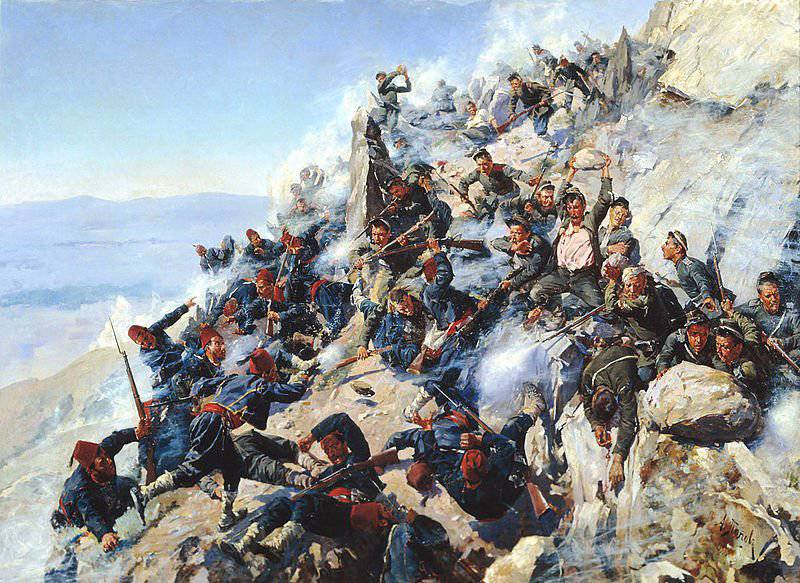
Protection of the “Eagle's Nest” by orlovtsy and Bryants 12 of August 1877 of the year (Popov A.N., 1893).
On the night of August 12, reinforcements led by Major General Mikhail Dragomirov arrived at the pass (2 Brigade of the 14 Infantry Division). Ammunition, food and water were brought. Under the command of Radetsky, up to 14,2, thousands of people with 39 guns, he decided to go on the offensive the next day. He planned to knock down the Turkish forces from two heights of the western ridge - the so-called Forest Hill and Bald Mountain, from where the enemy had the most convenient approaches to the Russian position and even threatened its rear. However, at dawn, Turkish troops again went on the offensive, striking the center of the Russian positions, and at lunchtime and on Mount St. Nicholas. Turkish attacks were repulsed in all directions, but the Russian counterattack on Lesnaya Kurgan was not a success. The 13 (25) of August, the Russians resumed the attacks on the Forest Mound and Lysa Mountain, Radetsky by this time received more reinforcements - the Volynsky Regiment with a battery. Suleiman Pasha by this time significantly strengthened his left flank, so the stubborn battle for these positions went on all day. Russian troops were able to knock down the enemy from the Forest mound, but could not capture Bald Mountain. The Russian troops retreated to the Forest mound and here during the night and morning of 14 th fought off enemy attacks. All Turkish attacks were repelled, but the Stoletov detachment suffered so significant losses that, without receiving reinforcements, it was forced to leave the Forest Mound, retreating to the Side Hill.
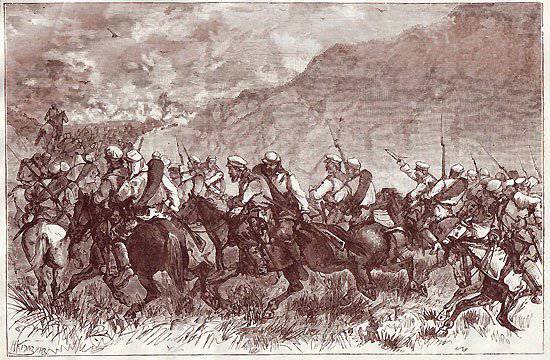
The vanguard of the 4 Infantry Brigade of Major General A.I. Tsvetsinsky hurries to Shipka.
In six days of fighting at Shipka, the Russians lost up to 3350 people (including 500 Bulgarians), i.e. virtually all of the original garrison, including generals Dragomirov (was seriously wounded in the leg), Derozhinsky (killed), 108 officers. Turkish losses were higher - about 8 thousand people (according to other data - 12 thousand). As a result, the Russian troops were able to win a strategic victory - a breakthrough of the Turkish troops through the pass and their decisive offensive against one of the flanks of the stretched disposition of the Russian army would not only force the rest to retreat, but could lead to cutting them off from the Danube. Particularly dangerous was the position of the detachment of Radetsky, the most distant from the Danube. Even the question was raised about the withdrawal of the Radetsky forces and the cleansing of the Shipka Pass, but then it was decided to strengthen the pass garrison. In tactical terms, the position of our troops on the pass was still difficult, they were captured by the enemy from three sides, and autumn and in winter even more deteriorated.
National Park Museum at the Shipka Pass. "Steel" battery.
"Shipka seat"
From 15 (27) August, the Shipka Pass was defended by the 14 Infantry Division and the 4 Infantry Brigade, under the command of Major General Mikhail Petrushevsky. Orlovsky and Bryansk regiments, as those who suffered the greatest losses, were taken to the reserve, and the Bulgarian militia were transferred to the village of Green Tree to take a path through the Imitli pass, bypassing Shipka from the west. The defenders of the Shipka Pass, doomed to passive defense, from this point on were most concerned about strengthening their positions and their settlement. Built closed passages posts with rear.
The Turks also carried out fortification work, strengthening their battle formations, and carried out constant gun-and-gun shelling of Russian positions. From time to time they made fruitless attacks on the village of Green-Tree and Mount St. Nicholas. 5 (17) September, at 3 hours of the night, Turkish troops launched a strong attack from the southern and western sides. Initially, they were successful, they were able to capture the so-called. The Eagle's Nest is a rocky and precipitous cape, outstanding in front of the mountain of Sts. Nicholas. But then the Russians counterattacked and, after a desperate hand-to-hand fight, they rejected the enemy. An enemy strike from the west, from the side of the Forest mound, was also repelled. After this, there were no serious attacks. The fighting was limited to shootouts. 9 November Wessel Pasha attacked the mountain of St. Nicholas, but very unfortunate, because the blow was repulsed with heavy losses for the Turkish troops.
Snow trenches (Russian positions on the Shipka Pass). V.V. Vereshchagin.
Soon the Russian soldiers had to pass a serious exam, which was held by nature. The position of the troops on Shipka became extremely difficult with the onset of winter, the frosts and blizzards on the mountain tops were particularly sensitive. From mid-November, fierce frosts and frequent snow storms began, the number of people getting sick and frosting on some days reached 400 people, the sentinels simply were blown away. Thus, the three regiments of the arrived 24 division were literally mowed down with disease and frostbite. During the period from September 5 to December 24, 1877 of the Shipnikin detachment, combat losses amounted to about 700 people killed and wounded, and sick people - up to 9,5 thousands.
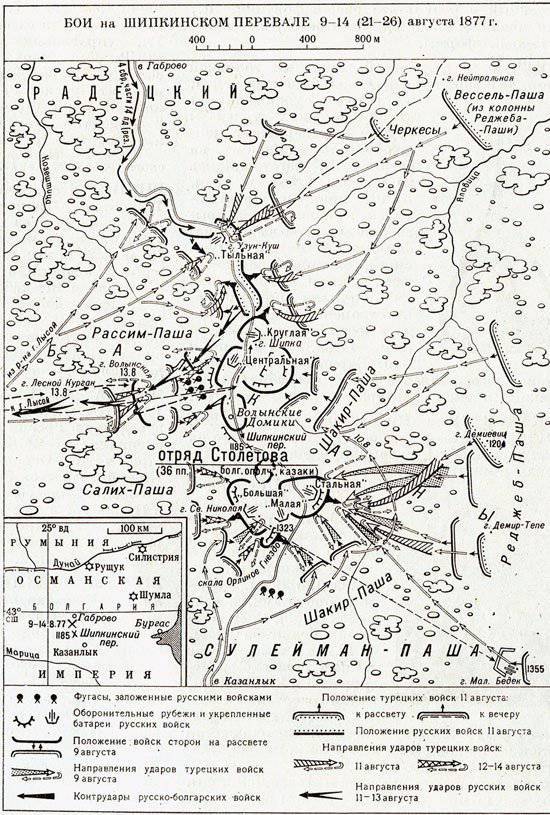
Battle of Shane's 26 - 28 December 1877 of the Year (7 - 9 January 1878 g.)
The last act of battle for Shipka attack the positions of the Turkish troops on the road from the mountains of St.. Nicholas to the village Shipka (the battle of Sheinovo). After the fall of Plevna in November 28 (December 10), the number of Radetzky troops was brought to 45 thousand people. However, even in these conditions, the attack of heavily fortified positions of Wessel Pasha (he had about 30 thousand people) was risky.
It was decided to attack the vast Turkish camp in the valley against the Shipka Pass in two columns, which were supposed to make a detour: 19-thousand. Eastern column under the leadership of Svyatopolk-Mirsky, through the Trevnensky Pass and 16-thousand. Western column under the command of Mikhail Skobelev, through the Imitli pass. Under the leadership of Radetsky, about 10-11 thousand people remained, they remained on Shipkinsk positions. The columns of Skobelev and Svyatopolk-Mirsky were made on December 24, both columns encountered great difficulties, overcoming the snowy debris, had to leave almost all the artillery. On December 26, the column of Svyatopolk-Mirsky descended to the southern side of the mountains, the main forces took up positions near the village of Gusovo. Skobelev's column, in addition to natural obstacles, faced the Turkish troops, occupying the heights dominating the southern descent, which had to be occupied with a battle. Avant-garde Skobelev only by the evening of December 26 was able to reach the village of Imitliya, and the main forces were still on the pass.
On the morning of December 27, Svyatopolk-Mirsky launched an attack on the eastern front of the Turkish camp. The camp was about 7 versts in a circle and consisted of 14 redoubts that had trenches in front and in between. By 1 one o'clock in the afternoon Russian troops seized the first line of Turkish fortifications in this direction. Part of the forces of Svyatopolk-Mirsky occupied Kazanlak, blocking the route of the retreat of the Turkish troops to Adrianople. The troops of the western column 27-go continued to shoot down the Turks from the dominant heights and because of the insignificance of forces that crossed the mountains, Skobelev did not dare to launch an offensive. In the morning of the 28, the Turks launched a counteroffensive against the eastern column, but were driven back, the Russians captured Shipka and several fortifications. A further attack on the column of Svyatopolk-Mirsky was impossible, because the attack had not yet begun on Skobelev’s side, and the troops suffered heavy losses and spent most of the ammunition.
Radetzky, having received a report from Svyatopolk-Mirsky, decided to hit the front of the Turkish positions and pull some of the Turkish forces back on him. At 12 hours of the day, the 7 battalions descended from the mountain of Sts. Nicholas, but further progress, along a narrow and icy road, under heavy enemy rifle and artillery fire, led to such high losses that the Russian troops, having reached the front line of enemy trenches, were forced to retreat. However, this attack diverted considerable forces of the Turkish army and artillery, which could not be used for a counterattack against the troops of Svyatopolk-Mirsky and Skobelev.
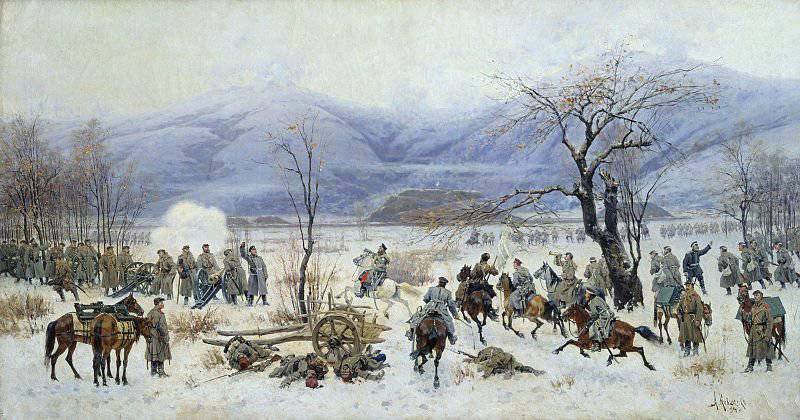
Battle at Shipka-Sheinovo 28 December 1877 of the year (Kivshenko A.D., 1894).
Radetsky did not know that in the 11 watch, Skobelev launched his attack, directing the main attack against the south-western part of the enemy positions. Soon his forces broke into the middle of the fortified camp. At the same time, the column of Svyatopolk-Mirsky resumed. Around 3 hours Wessel Pasha, convinced of the impossibility of further resistance and retreat, decided to capitulate. Troops that held positions in the mountains also received orders to surrender. Only part of the Turkish cavalry was able to escape.
As a result of the battle at Shainovo, the Russian troops lost about 5,7 thousand people. The Army of Wessel Pasha ceased to exist, only prisoners were about 23 thousand people, also captured 93 guns. This victory had important consequences - in fact, the shortest way to Adrianople and Constantinople was opened. So ended the battle for Shipka.
The defense of Shipka is still one of the symbols of the strength and courage of the Russian soldiers. For Bulgaria, the name Shipka is a shrine, since this was one of the main battles that brought freedom to the Bulgarian people after the almost five-century Ottoman yoke.
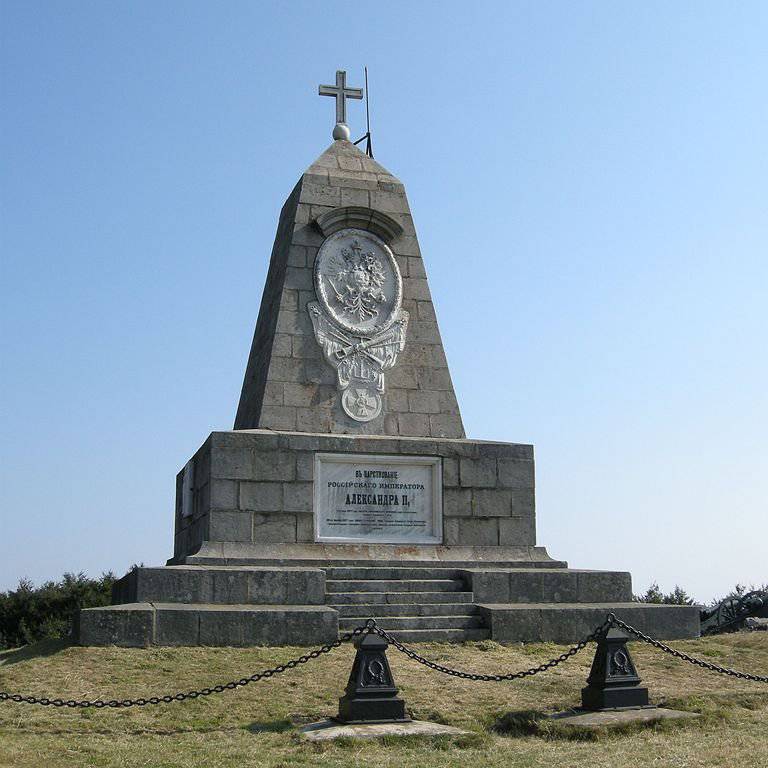
"Big" Russian monument on Shipka.
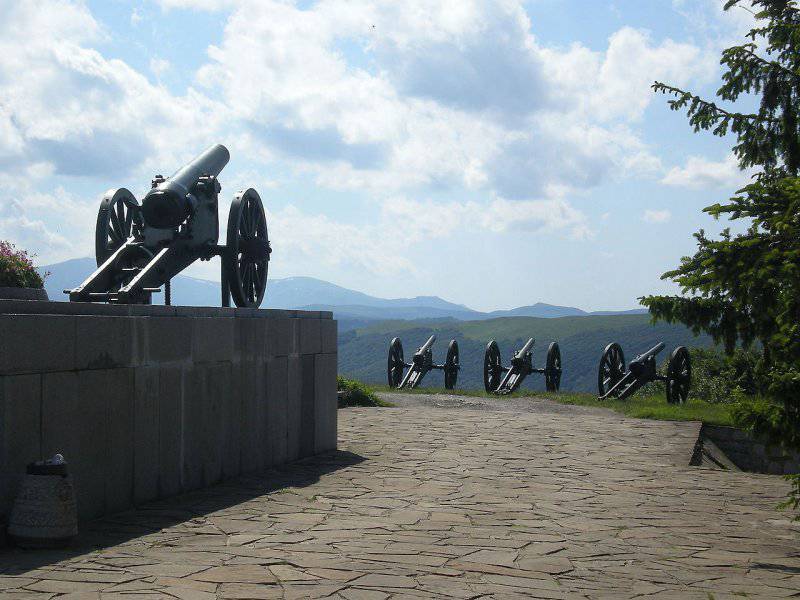
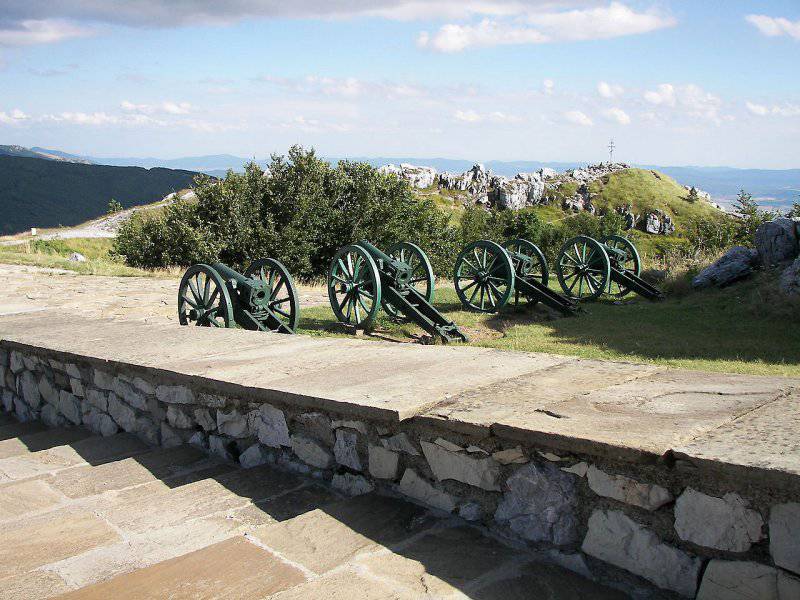
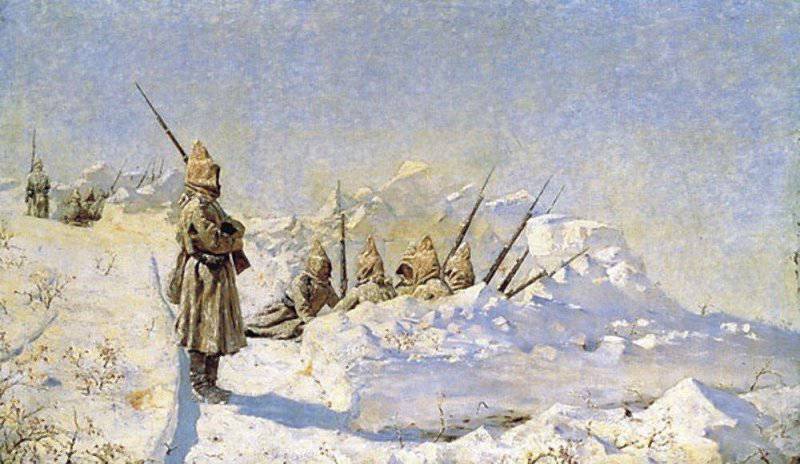
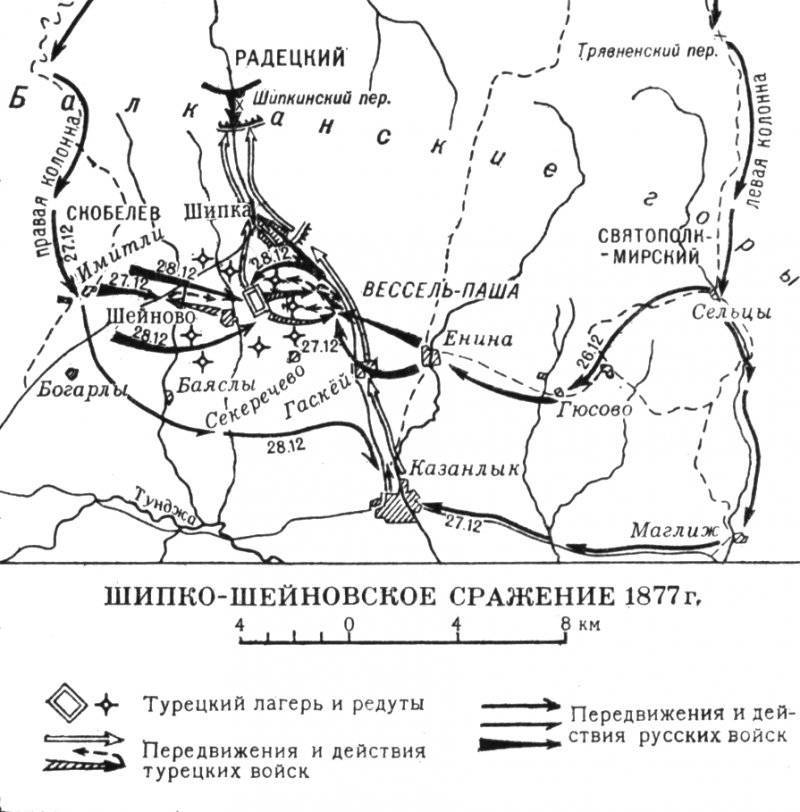
Information